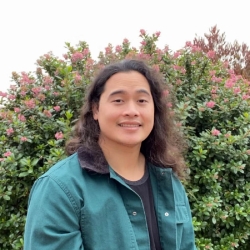
Nam Him
Alt text: Nam smiles in front of a green bush with red flowers. He has long wavy brown hair and wears a teal jacket.
Nam Him is a senior at SFSU and a disabled USMC veteran. He is double majoring in Biochemistry / Biology: Concentration in Physiology and minoring in math with aspirations to become a physician. He is a first-generation Asian American straight cis male of mixed Asian heritage. Nam is Vietnamese, Cambodian, Lao and Chinese. He comes from a socially disadvantaged background and is a son of refugee parents of the Vietnam War and Cambodian genocide.
Growing up in the Sacramento area, he and his family struggled to fit in. His parents’ trauma from surviving a war and genocide made it difficult for them to help steer their children’s lives in America. Nam found stability and navigation during his time in the military. After his service, he went to college but didn’t find his passion and goals until a health crisis.
When transitioning from active service to a traditional student, he became lost and was depressed. He developed some physical injuries that affected his physical and mental well-being. Fortunately, he was able to find help at the San Francisco VA Medical Center. After some psychiatry visits and physical therapy, slowly he rebuilt himself back up. The medical staff helped sparked his interest to become a physician.
During his search for care, communication and transparency stood out. It is vital to easily communicate with your doctor and care team. Feeling listened to and understood helped put him at ease. He began to understand how to better communicate with his two autistic brothers. He reflected on witnessing them be misunderstood and tormented because of their autism. He didn’t have the skills or patience to advocate for them, but he has grown and is now better equipped.
His own diagnosis of ADHD has opened his eyes to a different way of thinking. The stigma behind being disabled shouldn’t prevent anyone from seeking help. Being different doesn’t mean you can’t continue to live a normal life. Having a disability doesn't mean that you are a person of lesser value. With this insight, he hopes to find ways to make communication easier for those with disabilities. He hopes his experience can help him better relate to and bring more transparency to disabled people within the healthcare industry.